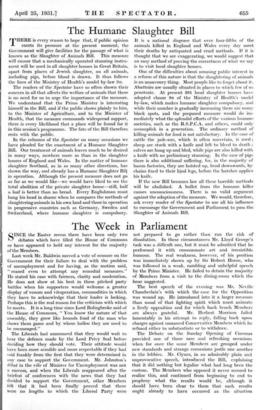The Humane Slaughter Bill
THERE is every reason to hope _that, if public opinion exerts its pressure at the present moment, the Government will give facilities for the passage of what is known as the Slaughter of Animals Bill. This measure will ensure that a mechanically operated stunning instru- ment will be used in all slaughter houses in Great Britain, apart from places of Jewish slaughter, on all animals, including pigs, before blood is drawn. It thus follows the lines of the Ministry of Health's model by-law 9B.
The readers of the Spectator have so -often shown their concern in all that affects the welfare of animals that there is no need for us to urge the importance of the measure. We understand that the Prime Minister is interesting himself in the Bill, and if the public shows plainly to him, to the Minister of Agriculture, and to the Minister of Health, that the measure commands widespread support, there is every likelihood that a place will be found for it in this session's programme The fate of the Bill therefore rests with the public.
In the columns of the Spectator on many occasions we have pleaded for the enactment of a Humane Slaughter Bill. Our treatment of animals leaves much to be desired in many ways, nowhere more so than in the slaughter houses of England and Wales. In the matter of humane slaughter Scotland, as in so many other directions, has shown the way, and already has a Humane Slaughter Bill in operation. Although the present measure does not go as far as we would like—we would have liked to see the total abolition of the private slaughter house—still, half a loaf is better than no bread. Every Englishman must hang his head in shame when he compares the methods of slaughtering animals in his own land and those in operation in progressive countries such as Germany, Sweden and Switzerland, where humane slaughter is compulsory. It is a national disgrace that over four-fifths of the animals killed in England and Wales every day meet their deaths by antiquated and cruel methods. If it is thought that we are exaggerating, we would suggest that an easy method of proving the correctness of what we say is to visit local slaughter houses.
One of the difficulties about arousing public interest in a reform of this nature is that the slaughtering of animals is an unsavoury thing. Most people like to forget about it. Abattoirs are usually situated in places to which few of us penetrate. At present 391 local slaughter houses have adopted clause 9B of the Ministry of Health's model by-law, which makes humane slaughter compulsory, and while their number is gradually increasing there are many black spots, and the proposed measure would do im- mediately what the splendid efforts of the various humane societies, such as the R.S.P.C.A. and others, could only accomplish in a generation. The ordinary method of killing animals for food is not satisfactory. In the case of cattle the pole-axe, which is often uncertain, is used ; sheep are stuck with a knife and left to bleed to death ; calves are hung up and bled, while pigs are also killed with a knife with no preliminary stunning. In the case of pigs there is also additional suffering, for, in the majority of bacon factories, they are hoisted up, head downwards, by chains fixed to their hind legs, before the butcher applies his knife.
If the new Bill becomes law all these horrible methods will be abolished. A bullet from the humane killer causes unconsciousness. There is no valid argument against the adoption of the measure. We would, therefore, ask every reader of the Spectator to use all his influence to encourage the Government and Parliament to pass the Slaughter of Animals Bill.






































 Previous page
Previous page